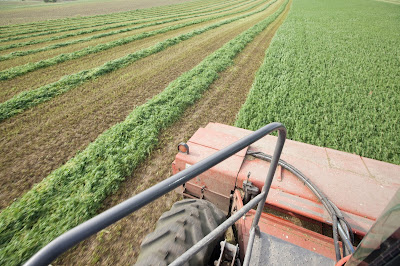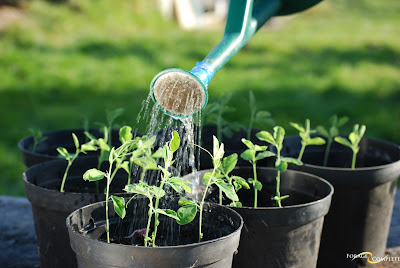The Importance of Alfalfa as a Crop and Animal Feed
Alfalfa is among the most important forage crops in the world. Also known as “The Forage Queen,” it is one the top five crops grown in the United States (the others are corn, soybean, wheat and cotton).
What makes it so special? Read below to find out.
Where Does Alfalfa Grow?
Alfalfa grows in most of the US. The largest producers include California, Idaho, Montana, South Dakota and North Dakota.
According to research, the average annual yield of alfalfa in the US is approximately 3.35 tons per acre. Farmers often grow it with several other plants, including legumes and grasses.
Alfalfa is frequently used in biomass energy production. Also, it fixes more nitrogen than any legume crop can. This allows farmers to grow other crops easier and reduce their reliance on expensive nitrogen fertilizers.
Alfalfa in Animal Feed
Alfalfa makes excellent animal feed. Not only is it a rich source of minerals and vitamins, it also contains up to 22% of crude protein. It contains vitamins such as A, E, K, D, B1, C, B2, B12, U, B6 and acids such as folic acid, panthothanic acid, biotin, niacin and inocitole. In addition to these, alfalfa has high levels of calcium, sodium, potassium, phosphorus, sulfur, copper, chlorine, magnesium, iron, boron, manganese and cobalt.
Alfalfa is used to feed several animals, including horses, cattle, chickens, turkey and sheep. Feeding animals alfalfa hay helps produce better wool, meat, milk and other products.
The benefits of feeding alfalfa to dairy animals include the following:
·It yields more crude protein and soluble proteins than any other sources.
· It reduces the amount of cud that cows need to chew.
·It increases the capacity of buffering.
· It promotes fast digestion of NDF (neutral detergent fiber)
Alfalfa and Biomass Energy
Farm owners also use alfalfa for the bioremediation of the soils having a large content of nitrogen, for generating electricity and for production of enzymes such as cellulase, alpha amylase, phytase and lignin peroxidase. Undoubtedly, alfalfa is an excellent and the most versatile form of crop that finds great usage in multiple areas.
Forage Complete is an outstanding supplier of Non GMO alfalfa seed and other organic products like corn, oats, grass and clover. The company combines the highest standard of service with remarkably high-quality seeds. Customers trust Forage Complete to provide them with first-rate products which return the most on their investment.
About Forage Complete:
Forage Complete is a top supplier of NuTech seed as well as organic forage seed products and cover crops. With innovative genetic technology and intense research and testing, Forage Complete delivers the finest seeds available anywhere.
For more information, please visit Foragecomplete.com
Where Does Alfalfa Grow?
Alfalfa grows in most of the US. The largest producers include California, Idaho, Montana, South Dakota and North Dakota.
According to research, the average annual yield of alfalfa in the US is approximately 3.35 tons per acre. Farmers often grow it with several other plants, including legumes and grasses.
Alfalfa is frequently used in biomass energy production. Also, it fixes more nitrogen than any legume crop can. This allows farmers to grow other crops easier and reduce their reliance on expensive nitrogen fertilizers.
Alfalfa in Animal Feed
Alfalfa makes excellent animal feed. Not only is it a rich source of minerals and vitamins, it also contains up to 22% of crude protein. It contains vitamins such as A, E, K, D, B1, C, B2, B12, U, B6 and acids such as folic acid, panthothanic acid, biotin, niacin and inocitole. In addition to these, alfalfa has high levels of calcium, sodium, potassium, phosphorus, sulfur, copper, chlorine, magnesium, iron, boron, manganese and cobalt.
Alfalfa is used to feed several animals, including horses, cattle, chickens, turkey and sheep. Feeding animals alfalfa hay helps produce better wool, meat, milk and other products.
The benefits of feeding alfalfa to dairy animals include the following:
·It yields more crude protein and soluble proteins than any other sources.
· It reduces the amount of cud that cows need to chew.
·It increases the capacity of buffering.
· It promotes fast digestion of NDF (neutral detergent fiber)
Alfalfa and Biomass Energy
Farm owners also use alfalfa for the bioremediation of the soils having a large content of nitrogen, for generating electricity and for production of enzymes such as cellulase, alpha amylase, phytase and lignin peroxidase. Undoubtedly, alfalfa is an excellent and the most versatile form of crop that finds great usage in multiple areas.
Forage Complete is an outstanding supplier of Non GMO alfalfa seed and other organic products like corn, oats, grass and clover. The company combines the highest standard of service with remarkably high-quality seeds. Customers trust Forage Complete to provide them with first-rate products which return the most on their investment.
About Forage Complete:
Forage Complete is a top supplier of NuTech seed as well as organic forage seed products and cover crops. With innovative genetic technology and intense research and testing, Forage Complete delivers the finest seeds available anywhere.
For more information, please visit Foragecomplete.com



Comments
Post a Comment